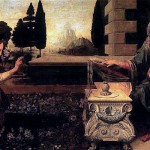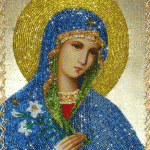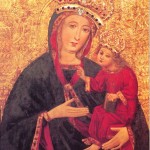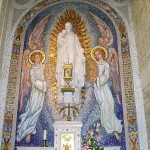As Jesus was saying these things, a woman in the crowd called out, “Blessed is the mother who gave you birth and nursed you.” He replied, “Blessed rather are those who hear the word of God and obey it.” Luke, 11:27-28
Here, rather than portraying Jesus dismissing his mother, Luke is portraying him doing the exact opposite, by setting up an explicit parallel with another well-known passage:
And the angel being come in, said unto her: Hail, full of grace, the Lord is with thee: blessed art thou among women. Luke 1:28
Mary is blessed, because she heard the Word of God and kept it. Indeed, Mary is Jesus’ mother only because she heard the Word of God, leading to the Medieval quip that Jesus was conceived through the ear.
In Catholic Tradition, Mary is understood as a type of the Church, and vice versa. To meditate on Mary is to learn about the Church, to meditate on the mystery of the Church is to learn about Mary.
Mary is the New Eve, and the Church is also the New Eve: fashioned from the side of the New Adam, whence the salvific baptismal water flowed.
Mary is the one who heard the Word of God, and received it, and kept it, and “pondered” it, and then shared it with the world.
As a historical matter, in giving the Great Commission to the apostles, the Risen Jesus gave them the command and the authority to preach the Gospel to all nations. And this they did. And, decades later, one of the ways in which they did so was to write the books we now know as the books of the New Testament. The Church received the Word and birthed it, putting together the Biblical canon. The Bible, then, stands at the heart of the Church’s Gospel proclamation, but cannot be reduced to it, but only finds its true place within the great Apostolic Tradition founded by our Lord himself.
In chapter 5 of the Book of Revelation, we find that the only one who can open “the Scrolls”, that is to say, the Scriptures, is “the lion of the tribe of Juda, the root of Jesse,” our Lord–whose mystical Body is the Church, the pillar and foundation of Truth, and who said, “Behold, I am with you, to the end of the age.”
To “open the Scrolls,” then, we must do so from the heart of the Church. In other words, we must, like the Church, be like Mary, and be blessed because we heard the Word and keep it. It is Mary who helps us unlock the Scriptures.
Which brings me to the Rosary. In the Rosary, we are invited, as we pray each decade, to meditate upon one of the great mysteries of the Christian faith, each of which was passed down to us through Scripture. As we pray the deeply biblical prayer of the Ave Maria, we become like Mary, hearing and receiving the Word, and Mary helps us open the Scrolls. As we pray the Rosary, we enter in the communion of saints, within the communal prayer of the Church–one thing you can bet is that as you’re reading this, someone, somewhere is praying the Rosary–who receives the Word and shares it with us.
The Bible does not have just a literal sense, but a deeper, more divine spiritual sense, which must be accessed through prayer and meditation upon its mysteries. It is, first and foremost, a liturgical document, produced by and for the liturgy of the Church, and so we can only “enter into it” in a liturgical, prayerful way. To pray the Rosary, then, is to enter into the Bible in a deeply powerful and intimate way, one which is more orthodox than painstaking exegesis disconnected from the living, Spirit-inspired Tradition passed from our Lord to the Apostles.











